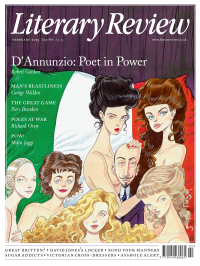Vernon Bogdanor
Ruling Passions
On Politics: A History of Political Thought from Herodotus to the Present
By Alan Ryan
Allen Lane/The Penguin Press 1,114pp £40
Alan Ryan has been teaching and thinking about political theory at Oxford and Princeton for over forty years. Thirty-five years ago, a publisher suggested that he write a volume to replace G H Sabine’s standard history of political thought. This doorstop is the result.
Sabine’s book is superior hackwork, a textbook that covers the ground conscientiously but does little to inspire the reader. There is also a multivolume Cambridge History of Political Thought, a sound work of scholarship, laboriously based on the sources and relentlessly dull. On Politics holds the advantage on every count.

Sign Up to our newsletter
Receive free articles, highlights from the archive, news, details of prizes, and much more.@Lit_Review
Follow Literary Review on Twitter
Twitter Feed
It wasn’t until 1825 that Pepys’s diary became available for the first time. How it was eventually decrypted and published is a story of subterfuge and duplicity.
Kate Loveman tells the tale.
Kate Loveman - Publishing Pepys
Kate Loveman: Publishing Pepys
literaryreview.co.uk
Arthur Christopher Benson was a pillar of the Edwardian establishment. He was supremely well connected. As his newly published diaries reveal, he was also riotously indiscreet.
Piers Brendon compares Benson’s journals to others from the 20th century.
Piers Brendon - Land of Dopes & Tories
Piers Brendon: Land of Dopes & Tories - The Benson Diaries: Selections from the Diary of Arthur Christopher Benson by Eamon Duffy & Ronald Hyam (edd)
literaryreview.co.uk
Of the siblings Gwen and Augustus John, it is Augustus who has commanded most attention from collectors and connoisseurs.
Was he really the finer artist, asks Tanya Harrod, or is it time Gwen emerged from her brother’s shadow?
Tanya Harrod - Cut from the Same Canvas
Tanya Harrod: Cut from the Same Canvas - Artists, Siblings, Visionaries: The Lives and Loves of Gwen and Augustus John by Judith Mackrell
literaryreview.co.uk